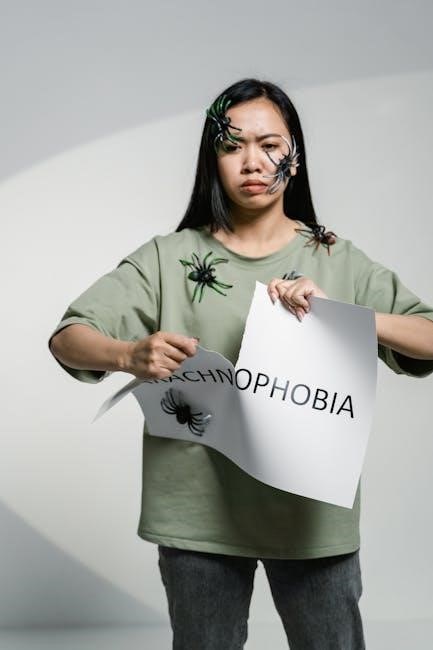Internalized homophobia‚ a deeply ingrained and often unconscious form of self-hatred‚ arises when individuals absorb and internalize societal prejudice against homosexuality. This psychological phenomenon occurs when people‚ often from a young age‚ are exposed to homophobic views‚ whether through family‚ culture‚ or societal norms. Over time‚ these negative messages become part of their self-perception‚ leading to feelings of shame‚ guilt‚ and self-doubt.
Internalized homophobia can manifest in various ways‚ such as self-denial of one’s true identity‚ suppression of emotions‚ or even self-criticism for being part of the LGBTQ+ community. It can also lead to distancing oneself from others who identify as queer‚ perpetuating a cycle of isolation and alienation. This internal conflict often stems from the fear of rejection‚ ridicule‚ or violence‚ which is reinforced by a heteronormative and discriminatory environment.
The effects of internalized homophobia are profound and far-reaching. It can hinder personal growth‚ damage relationships‚ and contribute to mental health issues such as depression‚ anxiety‚ and low self-esteem. Many individuals struggle with feelings of inadequacy‚ questioning their worthiness of love and acceptance. This psychological burden can make the journey of self-acceptance particularly challenging‚ as it requires confronting deeply rooted beliefs and societal conditioning.
Understanding and addressing internalized homophobia is crucial for fostering self-acceptance and emotional well-being. It involves recognizing the harmful narratives that have been internalized and actively working to reframe them. Through self-reflection‚ education‚ and support from others‚ individuals can begin to heal and embrace their authentic selves. Overcoming internalized homophobia is not just a personal journey but also a step toward creating a more inclusive and compassionate society for all.

Understanding Internalized Homophobia
Internalized homophobia is a complex and deeply rooted psychological phenomenon that arises when individuals internalize negative societal attitudes and prejudices toward homosexuality. It is a process through which individuals‚ often unconsciously‚ absorb homophobic messages from their environment and integrate them into their self-perception. This internalization can lead to feelings of self-hatred‚ shame‚ and self-doubt‚ which can profoundly impact a person’s mental health and well-being.
Definition and Origins
Internalized homophobia is not merely a personal issue but is deeply rooted in societal structures and cultural norms. From a young age‚ individuals are exposed to messages that perpetuate heteronormativity and often condemn homosexuality. These messages can come from various sources‚ including family‚ religion‚ education‚ media‚ and social interactions. Over time‚ these negative messages can become internalized‚ leading individuals to view themselves through a lens of shame and self-rejection.
The process of internalization begins when individuals are repeatedly exposed to homophobic attitudes and beliefs. For example‚ growing up in a society where heterosexuality is consistently portrayed as the norm can lead individuals to feel that their same-sex attractions or gender nonconformity are abnormal or unacceptable. This can be particularly damaging for those who identify as LGBTQ+‚ as they may struggle to reconcile their true selves with the negative messages they have internalized.
Psychological Effects
The psychological effects of internalized homophobia can be severe and far-reaching. Individuals who experience internalized homophobia often struggle with low self-esteem‚ self-blame‚ and a lack of self-acceptance. These feelings can manifest in various ways‚ including depression‚ anxiety‚ and even self-destructive behaviors. The internal conflict created by societal prejudice and personal identity can lead to a fragmented sense of self‚ making it difficult for individuals to form healthy relationships or achieve emotional well-being.
Research has shown that internalized homophobia is strongly linked to mental health issues such as sexual depression‚ sexual anxiety‚ and fear of sexuality. These psychological struggles can stem from the internalized belief that one’s sexual orientation or gender identity is inherently wrong or shameful. This self-rejection can also lead to a fear of being discovered or rejected by others‚ further exacerbating feelings of isolation and alienation.
Behavioral Manifestations
Internalized homophobia can also manifest behaviorally‚ often in ways that are harmful to the individual and others. For example‚ some individuals may attempt to suppress or deny their true identity‚ leading to a life of secrecy and dishonesty. This can result in feelings of inauthenticity and disconnection from oneself and others. In some cases‚ individuals may even perpetuate homophobic attitudes or behaviors as a way of coping with their own internalized shame.
Internalized homophobia can also lead to self-sabotaging behaviors‚ such as avoiding intimate relationships or engaging in risky or self-destructive behaviors. These actions often stem from a deep-seated belief that one is unworthy of love or acceptance. In some cases‚ individuals may even experience self-hatred that is so intense that it leads to self harm or suicidal thoughts.
Distinguishing Internalized Homophobia from Other Concepts

It is important to distinguish internalized homophobia from other related concepts‚ such as homophobia in general. While homophobia refers to the fear‚ dislike‚ or prejudice toward homosexuality‚ internalized homophobia specifically refers to the internalization of these attitudes by individuals who identify as LGBTQ+. This distinction is crucial‚ as internalized homophobia is a unique phenomenon that requires specific attention and understanding.
The Role of Societal Influences
Societal influences play a significant role in the development and perpetuation of internalized homophobia. From a young age‚ individuals are bombarded with messages that reinforce heteronormativity and often condemn homosexuality. These messages can come from various sources‚ including family‚ religion‚ education‚ media‚ and social interactions. For example‚ growing up in a society where heterosexuality is consistently portrayed as the norm can lead individuals to feel that their same-sex attractions or gender nonconformity are abnormal or unacceptable.

The media also plays a significant role in perpetuating internalized homophobia. Historically‚ LGBTQ+ individuals have been underrepresented or misrepresented in media‚ often being portrayed as stereotypes or villains. This lack of positive representation can contribute to feelings of invisibility and marginalization‚ further reinforcing internalized homophobia. In recent years‚ there has been an increase in positive representations of LGBTQ+ individuals in media‚ which has helped to challenge these negative stereotypes and promote greater acceptance.
Overcoming Internalized Homophobia
Overcoming internalized homophobia is a challenging but ultimately rewarding process. It requires individuals to confront and challenge the negative messages they have internalized and to work toward self-acceptance and self-love. This process often involves seeking support from others‚ whether through therapy‚ support groups‚ or close relationships with accepting friends and family.
Educating oneself about LGBTQ+ issues and history can also be an important step in overcoming internalized homophobia. Learning about the struggles and triumphs of others who have faced similar challenges can help individuals feel less alone and more connected to a larger community. Additionally‚ engaging in activism or advocacy work can provide a sense of purpose and empowerment‚ helping individuals to reclaim their identities and challenge societal norms.

Internalized homophobia is a deeply ingrained and complex issue that arises from the internalization of societal prejudice and negative attitudes toward homosexuality. It can have profound psychological and behavioral effects‚ leading to feelings of self-hatred‚ shame‚ and self-doubt. However‚ with self-awareness‚ education‚ and support‚ individuals can work to overcome internalized homophobia and achieve greater self-acceptance and emotional well-being.

Understanding internalized homophobia is the first step toward overcoming it. By recognizing the societal influences that contribute to this phenomenon and the ways in which it manifests in our lives‚ we can begin to challenge and change these patterns. Through self-reflection‚ education‚ and support‚ individuals can work to reframe their self-perception and embrace their authentic selves‚ ultimately leading to a more fulfilling and meaningful life.

